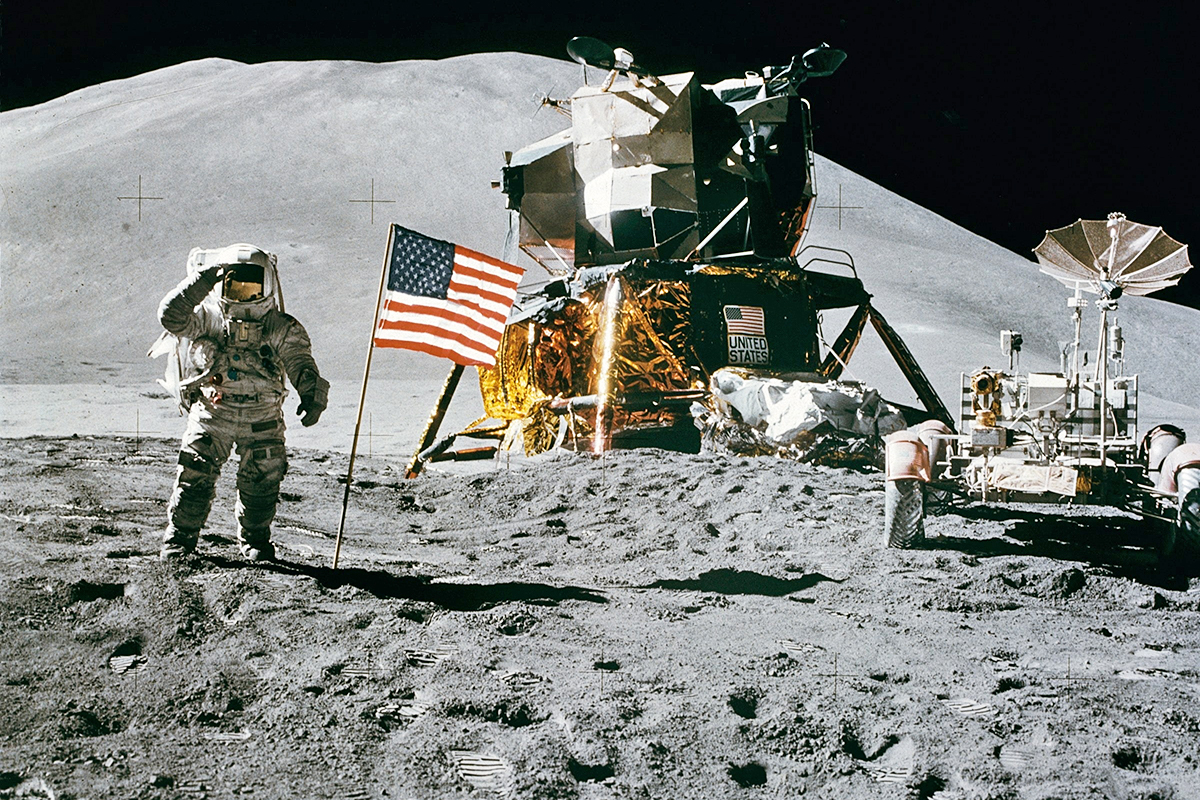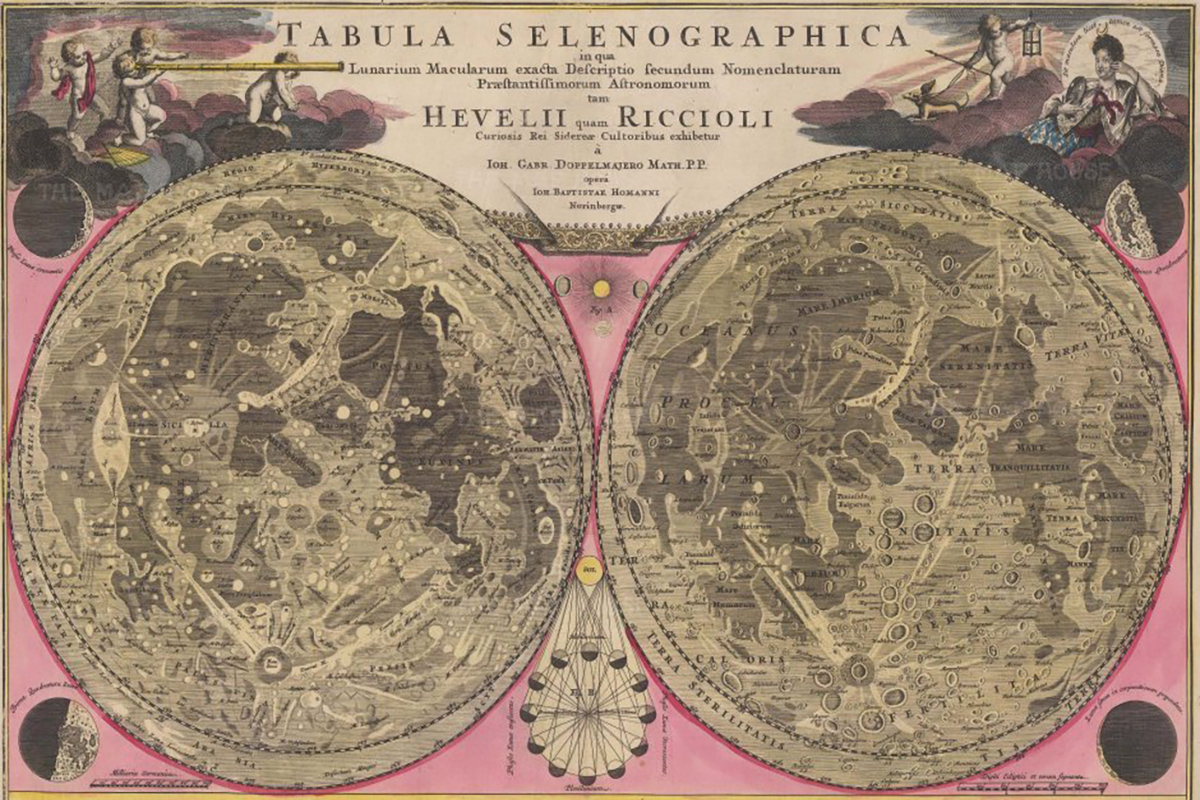
On July 20, 1969, the whole world watched as humankind made its first steps on the moon. It was at this moment in image history that began the expansion of human vision, photography and videography. As we’re coming up to the half century mark of exploring Earth’s celestial neighbor, museums and institutions across the globe have been launching exhibitions dedicated to Apollo 11’s journey to the moon and to humankind’s fascination of the silver orb we see in the night sky.

The Moon
On view:
July 19 – January 5, 2020
National Maritime Museum
Park Row, Greenwich Peninsula, London
In London, the National Maritime Museum is opening their exhibition, The Moon, on July 19. This exhibit will be featuring 180 objects that explores our history with the moon. It will include lunar samples collected by NASA’s Apollo missions and the Soviet Union’s Luna program, an ancient Mesopotamian tablet dated from 172 B.C. that shows how lunar eclipses were seen as bad omens and artwork by J.M.W. Turner, Larissa Sansour, El Anatsui and Tom Hammick.

Mapping the Moon: 1669-1969
On view:
June 21 – August 21, 2019
The Map House
54 Beauchamp Place, London
At London’s The Map House, Mapping the Moon: 1669-1969 (until 21 August) surveys the history of lunar map-making over the last 300 years. Among the historical celestial cartography will be engravings of the solar system from early 17th-century astronomers, a rare 1930s French horoscope-predicting device, Victorian-era decorated star maps and Buzz Aldrin’s space voyage documents. This exhibit goes to show us that mankind has been mapping the moon and its movements long before we even thought of walking on it.

Apollo’s Muse: The Moon in the Age of Photography
On view:
July 3 – September 22, 2019
The Metropolitan Museum
1000 Fifth Avenue, NY, New York
The Metropolitan Museum is celebrating the 50th anniversary of the moon landing by exhibiting Apollo’s Muse: The Moon in the Age of Photography, which is on display until September 22, 2019. The exhibition serves to showcase the visual representations of La Lune from the dawn of visual art to present day. The attraction features drawings, photographs, prints, paintings, astronomical instruments, films and camera equipment used by the Apollo astronauts.

Apollo 11
On view:
June 29 – January 2020
The Powerhouse Museum
Harris Street, Ultimo, Sydney, New South Wales
In Sydney, Australia, the Powerhouse Museum is hosting a lunar-themed exhibition titled Apollo 11. Apollo 11 observes the famous moment in astronomic history, the impact its left on science, design and culture and the important role Australia had in transmitting the celebrated footage. Items from around the world are on display for the audience, ranging from parts of the Redstone Rocket that put the first person in space, the computer NASA used to calculate the launch and landing and a feed horn used on the CSIRO Parkes Radio Telescope which was responsible for getting the first images of the moonwalk for international broadcasting. Additionally, there is an innovative virtual reality experience where museum goers can witness the Moon landing from the perspective of the third astronaut who stayed in orbit in the Command Module, an interactive arcade game, a life-size replica of the Mercury Capsule and more footage of the mission to the moon.

By the Light of the Silvery Moon: A Century of Lunar Photographs
On view:
July 14 – January 5, 2020
The National Gallery of Art
Constitution Ave NW, Washington, DC
America’s capitol is joining in on the commemoration by housing By the Light of the Silvery Moon: A Century of Lunar Photographs at the National Gallery of Art in Washington, DC. This exhibit showcases how photographic technology advanced the way the world saw the moon, ultimately roping us into a worldwide space race to experience it ourselves by sending a team of astronauts to explore its surface. This show contains around 50 artifacts, including Lunar Orbiter missions that led up to Apollo 11, glass stereographs, taken on the moon by Neil Armstrong and Buzz Aldrin, close-up views of three-inch-square areas of the lunar surface, as well as iconic NASA and press photographs of the astronauts that were disseminated widely in the wake of the mission’s success. Additionally, famous photographs from the 19th century will be featured, with a suite of Charles Le Morvan’s prints from 1914, which attempted to systematically map the entire visible lunar surface. The photographs on display tell a story of how art and science merged together and reveals how people view and understand the cosmos.

Apollo 11: One Giant Leap for Mankind
On view:
April 29 – January 12, 2020
Richard Nixon Presidential Library and Museum
18001 Yorba Linda Blvd, Yorba Linda, CA
Out west in Yorba Linda, California, the Richard Nixon Presidential Library and Museum opened a new interactive exhibit, Apollo 11: One Giant Leap for Mankind. Museum-goers can experience a 360-degree virtual reality exploration of the lunar surface from 1969. There are other artifacts on display including, moon rocks taken during the Apollo 15 and Apollo 17 missions, the Oval Office telephone that President Nixon used to call Neil Armstrong and Buzz Aldrin in space, Original of President Nixon’s draft speech prepared in the event of a “moon disaster”, and a 1969 American living room set up where viewers can sit and watch the moon landing just like people all across the globe did 50 years ago.

Destination Moon: The Apollo 11 Mission
On view:
April 13 – September 2, 2019
Museum of Flight
9404 E. Marginal Way South, Seattle, WA
The Museum of Flight in Seattle is hosting this exhibition’s only West Coast showing from its tour. In partnership with the Smithsonian Institution, the exhibit Destination Moon: The Apollo 11 Mission is featuring original objects from the mission, including dozens of NASA and Russian spaceflight additions. However, the main star of the show is the historic NASA Apollo 11 command module, Columbia. Museum visitors can see the spaceship up close, and can explore its intricate interior with an interactive 3-D tour created from the Smithsonian’s high-resolution scans. The Museum of Flight also showcases Space Race displays with rare artifacts like a Soviet Sputnik satellite, early astronaut spacesuits and the world’s only display of the remains of the rocket engines that boosted Apollo missions to the Moon. Additionally, there is a gallery about the legacy of the space industry in the Seattle area.
All of these exhibitions truly reveal humankind’s ever-growing astronomical and technological pursuit of the moon, space and beyond. One can only wonder what humanity will achieve within the next 50 years.


